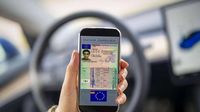Starting in April 2025, drivers in Germany will no longer be required to carry their physical driver's licenses. Instead, they will be able to present a digital version of their license stored on their smartphones during traffic stops. This significant change is part of a broader push towards digitization in transportation, spearheaded by the German Federal Ministry for Digital Affairs and Transport.
The new regulations mean that while drivers must still obtain a driver's license through traditional means—such as attending driving school and passing the driving test—they will not need to carry the physical card with them. Instead, a smartphone app will suffice. This app, which is set to launch alongside the new regulations, will contain a digital version of the driver's license, allowing for easier access during traffic checks.
According to reports from Inside-Digital, the app aims to alleviate the stress of forgetting a physical license at home. In the event of a traffic stop, drivers can simply pull out their phones instead of rummaging through their wallets. "This will make life easier for many drivers," stated a spokesperson from the ministry.
Furthermore, the digitization of vehicle documents will not stop at the driver's license. An open pilot program for a digital vehicle registration certificate is also set to begin at the end of March 2025, with around 2,500 participants invited to take part. This pilot will allow the ministry to test the digital vehicle registration under real conditions, ensuring that the system works effectively before a full rollout.
Despite these advancements, drivers are advised to continue carrying their paper vehicle registration certificates for the time being. Not all police authorities are aware of the legal changes regarding digital licenses, which could lead to confusion during traffic stops.
On a broader scale, the European Union is also moving towards a uniform digital driver's license that can be stored on mobile devices. This initiative aims to standardize driver's licenses across member states by 2030. However, member states will retain the option to implement their own health checks for drivers, particularly for older individuals. Currently, there are no mandatory health tests for obtaining a driver's license, although some countries, like Finland and Portugal, have already instituted such measures for senior drivers.
In Germany, the proposal to require drivers over 70 to renew their licenses every five years has been shelved for now. SPD traffic expert Thomas Rudner has voiced concerns that implementing mandatory health checks would lead to millions of additional examinations each year. Meanwhile, Transport Minister Volker Wissing has described such regulations as overly bureaucratic and not particularly effective.
In addition to the digital driver's license, the EU plans to extend accompanied driving throughout the European Union. This initiative aims to provide young drivers with supervised driving experience earlier in their training. In Germany, this model is already in place, allowing young drivers to gain practical experience under supervision.
Moreover, new regulations will allow volunteers in fire departments and other civil protection organizations to drive emergency vehicles with a class B license after completing additional training. This change aims to enhance the capacity of emergency services in various regions. Additionally, holders of a class B license will soon be able to operate vehicles weighing up to 4.25 tons after specific training or tests. Notably, for motorhomes equipped with alternative drives, this additional test will not be required if the driver has maintained a clean driving record for at least two years.
As the digital transformation of vehicle documentation progresses, there are still concerns to address. The ADAC, Europe's largest automobile club, has highlighted the necessity of maintaining traditional driver's license papers alongside the digital format. They emphasize the importance of ensuring that police can quickly identify revoked licenses and driving bans during checks.
In conclusion, while the transition to digital licenses may simplify processes for many drivers, it also raises questions about security, accessibility, and the potential for technological failures. As the launch date approaches, both the government and the public will be watching closely to see how these changes unfold in practice.








